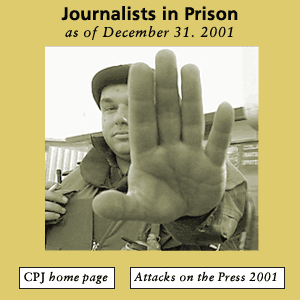Attacks on the Press 2002: United Kingdom
Press freedom is generally respected in the United Kingdom, but CPJ was alarmed by a legal case in which Interbrew, a Belgium-based brewing group, and the British Financial Services Authority (FSA), a banking and investment watchdog agency, demanded that several U.K. media outlets turn over documents that had been leaked to them. The case threatened…
Attacks on the Press 2002: Uzbekistan
Increased international aid and the presence of U.S. troops who use Uzbekistan as a base for the “war on terror” inspired President Islam Karimov to pay lip service to press freedom. With much fanfare, Karimov’s government ended prior censorship of newspapers–one of the few systems in the world that required papers to submit copy to…
TWO RADIO JOURNALISTS ATTACKED AS POLICE WATCH
New York, March 10, 2003—Two Uzbek journalists working for U.S. governmentfunded radio stations were attacked by a group of men on Friday, March 7, while trying to cover an anti-government protest in Uzbekistan’s capital, Tashkent. According to local and international press reports, Khusnutddin Kutbiddinov, of Radio Free Europe/Radio Liberty (RFE/RL), and Yusuf Rasulov, with Voice…
CPJ URGES UZBEKISTAN TO FREE LOCAL PRESS
Tashkent, June 10, 2002—A delegation from the Committee to Protect Journalists (CPJ) today completed a nine-day mission to Uzbekistan by calling on President Islam Karimov to free three jailed journalists and to change government policies that severely restrict press freedom in the country. In recent weeks, Uzbek officials formally abolished prior censorship. But local newspaper…
Attacks on the Press 2001: Introduction
IN THE WAKE of September 11, 2001, journalists around the world faced a press freedom crisis that was truly global in scope. In the first days and weeks after the terrorist attacks on New York City and Washington, D.C., governments across the globe–in China, Benin, the Palestinian Authority Territories, and the United States–took actions to…
Attacks on the Press 2001: Europe & Central Asia
The exhilarating prospect of broad press freedoms that followed the collapse of the Soviet Union a decade ago has faded dramatically in much of the post-communist world. A considerable decline in press freedom conditions in Russia during the last year, along with the stranglehold authoritarian leaders have imposed on media in Central Asia, the Caucasus,…
Attacks on the Press 2001: Uzbekistan
Torture of political and religious dissidents remains commonplace under the brutal regime of President Islam Karimov. In February, writer Emin Usman died in detention, and the July death of imprisoned human rights activist Shovriq Rusimorodov confirmed the deteriorating political situation. Karimov has also cracked down on civil liberties by jailing thousands of Muslims under the…

Attacks on the Press 2001: Journalists in Prison
There were 118 journalists in prison around the world at the end of 2001 who were jailed for practicing their profession. The number is up significantly from the previous year, when 81 journalists were in jail, and represents a return to the level of 1998, when 118 were also imprisoned.